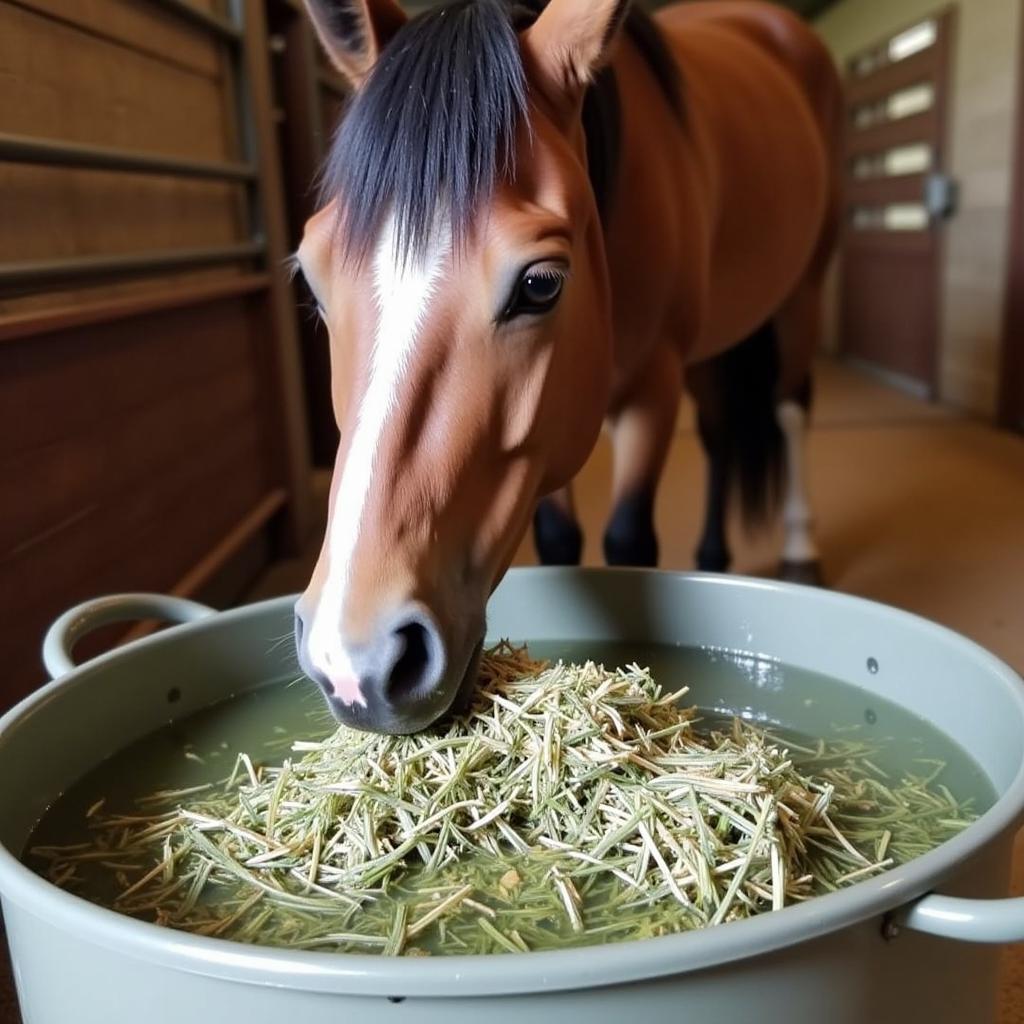Managing an Insulinwise Horse requires a comprehensive understanding of their specific needs. Within the first few weeks of implementing a new diet, you should start to see positive changes in your horse’s overall health and well-being. This article delves into the key aspects of caring for an insulinwise horse, providing valuable insights and practical advice for horse owners.
What Does InsulinWise Mean for Your Horse?
Insulin resistance (IR) in horses is a growing concern, and managing it effectively is crucial for their health and longevity. An “insulinwise” approach focuses on dietary and management strategies to regulate insulin levels and mitigate the effects of IR. This often involves carefully selecting feeds low in sugar and starch, promoting regular exercise, and managing weight. Insulin resistance can lead to a range of health issues, including laminitis, and understanding how to manage it is essential for every horse owner.
Dietary Management for the InsulinWise Horse
The cornerstone of managing an insulinwise horse is dietary control. Choosing the right feed is paramount. Prioritize low-sugar and low-starch feeds, such as those specifically formulated for insulin-resistant horses. Soaking hay can also help reduce sugar content. Remember, not all horses with IR are overweight, but careful monitoring of weight and body condition is crucial. Check out our insulinwise pellets for horses.
Forage Selection and Preparation
Forage should constitute the majority of an insulinwise horse’s diet. Opt for hay varieties known for their lower sugar content, such as mature grass hays. Testing hay for its sugar and starch levels can provide a more accurate assessment and guide your feeding decisions. Soaking hay in cold water for 30-60 minutes can significantly reduce sugar content, further benefiting insulinwise horses.
 Horse Eating Soaked Hay
Horse Eating Soaked Hay
Exercise and Weight Management for the InsulinWise Horse
Regular exercise is a critical component of managing an insulinwise horse. Even moderate exercise can significantly improve insulin sensitivity. Aim for daily turnout and encourage movement. Work with your veterinarian to develop an appropriate exercise plan for your horse, taking into account their individual needs and any underlying health conditions. If you’re looking for supplements to support your horse’s overall health, consider checking our Cushing’s supplements horses.
Creating a Safe and Effective Exercise Regimen
Develop an exercise plan that is both safe and effective for your insulinwise horse. Start slowly and gradually increase the intensity and duration of exercise as your horse’s fitness improves. Monitor your horse closely for any signs of discomfort or lameness. Consult with a veterinarian to determine the right dex for horses dosage if necessary for pain management related to underlying conditions. Remember that consistency is key when it comes to exercise for insulinwise horses.
“Regular exercise and proper dietary management are fundamental to the well-being of an insulinwise horse,” advises Dr. Sarah Thompson, Equine Veterinarian. “These strategies work synergistically to regulate insulin levels and prevent potential complications.”
Monitoring and Veterinary Care for the InsulinWise Horse
Regular veterinary check-ups are crucial for monitoring the insulinwise horse. This includes regular bloodwork to assess insulin levels and monitor for any other health concerns. “Early detection of any changes in insulin levels or other health indicators is vital for proactive management,” adds Dr. Thompson.
Conclusion
Managing an insulinwise horse requires a multifaceted approach that encompasses dietary management, exercise, and regular veterinary care. By diligently implementing these strategies, you can help your insulinwise horse live a healthier, happier, and more comfortable life.
FAQ
- What are the signs of insulin resistance in horses?
- How is insulin resistance diagnosed in horses?
- What are the long-term health risks of insulin resistance in horses?
- How often should an insulinwise horse be exercised?
- What types of hay are best for insulinwise horses?
- Can insulin resistance be reversed in horses?
- What other supplements can benefit an insulinwise horse?
If you need further assistance, please contact us at Phone Number: 0772127271, Email: [email protected] Or visit us at: QGM2+WX2, Vị Trung, Vị Thuỷ, Hậu Giang, Việt Nam. We have a 24/7 customer service team.